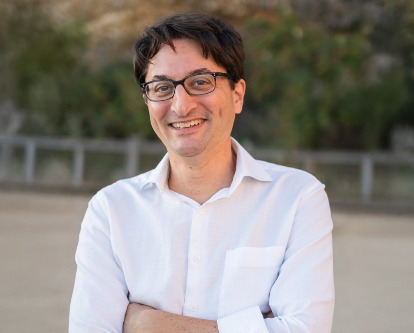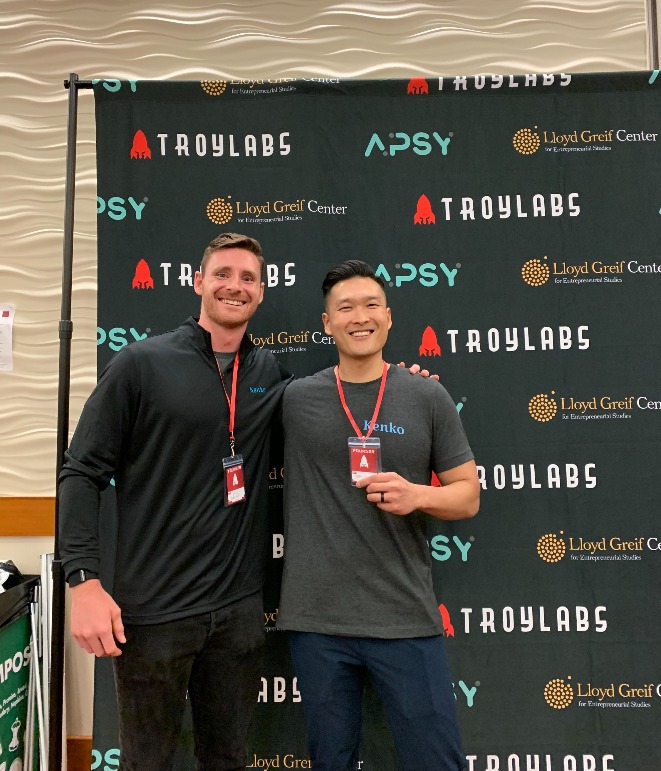
Interview: Paul Orlando in Beta Boom
Orlando explains how he and the Greif Incubator support founders at USC Marshall.
Marshall Students’ App is Changing the Way Athletes Recover from Injuries
Marshall Students’ App is Changing the Way Athletes Recover from Injuries
Identifying a gap in the digital fitness app space, Greif Center alumni are giving physical therapy patients power over their own healing with their new app: Kenko.

Kenko co-founders Joseph Rapaport ’23 and Allen Song ’23 at TroyLabs’ Demo Day.
[Photo courtesy of Rapaport and Song]
In 2017, self-guided apps like My Fitness Pal, Calm, Headspace, and Fitbit helped people lose weight, exercise regularly, and regain mental peace, all with integrations that allowed individuals to follow curated regimens based on their self-reported data and goals. Around the same time, CrossFit competitor, lifelong athlete, and Marshall alum Joseph Rapaport ’23 suffered a serious back injury in 2017. He had a choice: surgery or physical therapy? Rapaport chose the latter. But as he began attending physical therapy sessions and following up with at-home exercises, he felt that something was off.
“Technology was being integrated more into our daily lives, and yet in physical therapy they were still handing out sheets of paper with home exercise programs,” said Rapaport, a graduate of USC Marshall School of Business entrepreneurship program at the Lloyd Greif Center for Entrepreneurial Studies. “Similar to 90 percent of people who go through physical therapy, I ended up not doing what I was supposed to between sessions and ended up having chronic pain.”
Rapaport, who gained tech competency at Oracle and co-founded Opus (a fitness brand) decided to do something about it. He went back to school, graduating from the Master of Science in Entrepreneurship + Innovation (MSEI) program at the Greif Center in 2023. It was in a BAEP 552 Cases in Feasibility Analysis with Senior Lecturer in Clinical Entrepreneurship Albert Napoli that Rapaport and classmate Allen Song ’23 first pitched their idea for a physical therapy app that prioritized patients’ at-home recovery experiences. Kenko was born out of their own experiences and disappointments with traditional physical therapy solutions, which largely leave patients on their own.
“We realized that a lot of the solutions out there in the past were curated toward digitizing a piece of paper instead of building something a patient would like to use,” Rapaport said. “Given that my co-founder and I had the perspective of the patient, we wanted to take and tackle the problem through their lenses.
Kenko works by allowing physical therapists the flexibility to produce content or post content they have sourced from sites like YouTube, while also providing some original content. Additionally, by allowing therapists to film patient sessions, patients can access the exact exercises and notes they worked on with the therapist so they can continue their progress at home. Kenko gained steam as Rapaport and Song found validation, being named a finalist at the Greif Center’s annual New Venture Seed Competition.
“Receiving that money was a catalyst,” Rapaport said. Kenko also received a YP scholarship and was accepted into the Long Beach Accelerator as its first venture capital investment. In December 2023, Kenko also received an investment from the USC Marshall Venture Fund.
Kenko’s first MVP (minimum viable product) was a web application released in private in early 2024. Later, the founding duo pivoted to a mobile app, releasing their initial beta last spring.
We realized that a lot of the solutions out there in the past were curated toward digitizing a piece of paper instead of building something a patient would like to use.
— Joseph Rapaport ’23
Co-founder, Kenko
Among their resources, Rapaport cites the Trojan Network as fundamental to Kenko’s growth. Not only did the Kenko team utilize all that it could at the Greif Center, from entrepreneurship advice and mentorship to high-profile contests, they also looked beyond USC Marshall, particularly to the USC Divison of Biokinesiology and Physical Therapy. Here, Kenko found an alum to join the team as their strategic physical therapy adviser and link the platform to therapists who could pilot the app.
Currently, Kenko has over 30 physical therapists/clinics across the U.S. using the app. Next, the Kenko team is hoping to expand beyond physical therapy.
“We’re looking to become the tool for holistic care on the whole,” Rapaport said.
For now, the team is gratified by feedback from their current network of users.
“This came from our personal experiences and knowing how difficult it is to go through a recovery journey where 95 percent of it is up to you,” Rapaport said. “Seeing the platform be used the way we intended is incredible. It means we’re making an impact.”
RELATED
Interview: Paul Orlando in Beta Boom
Orlando explains how he and the Greif Incubator support founders at USC Marshall.
Research: Glenn Fox in Deseret News
Fox’s research shows that gratitude improves social bonding and stress regulation, while also inspiring individuals to do good.
Forbes 30 Under 30 Entrepreneur Shares His Journey from Business School to Startup Success
Bobby Pinckney ’20 is creating impact with innovative technological ventures and inspiring new Trojans to shape the future.
Cited: Michael Mische in CS Monitor
The Golden State is reconsidering its oil reserves and its policies.
Dean’s Dialogue: SpaceX CFO Bret Johnsen on Space Innovation and the Trojan Network
Bret Johnsen, a Leventhal alumnus, spoke with Marshall Dean Geoffrey Garrett about SpaceX’s cutting-edge projects, U.S. manufacturing, and the value of a USC education.